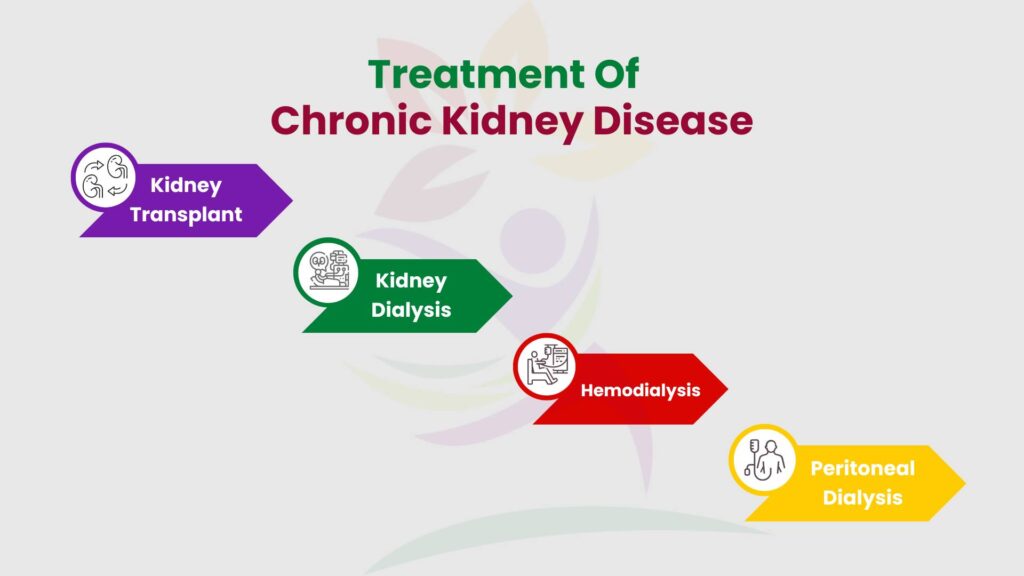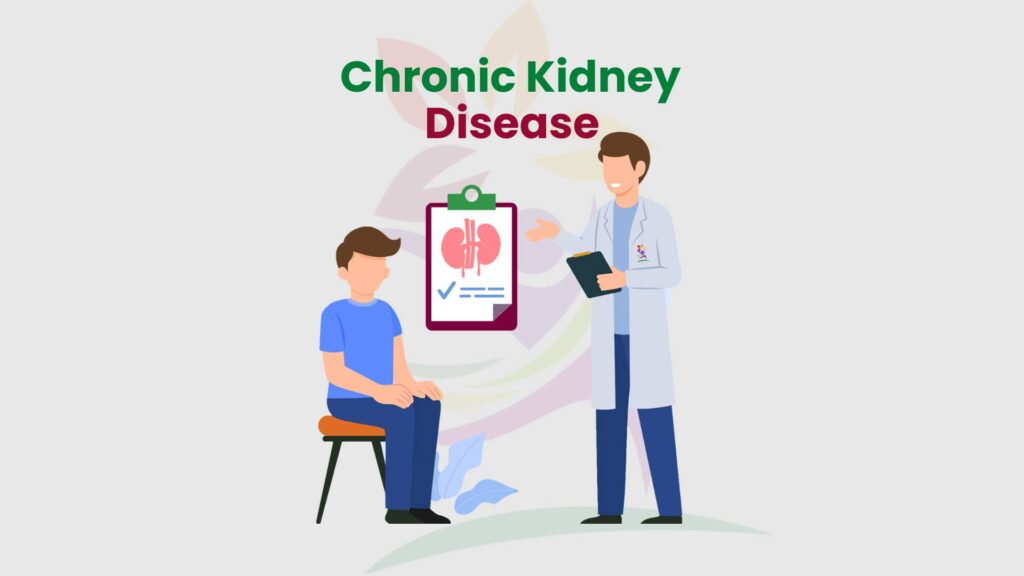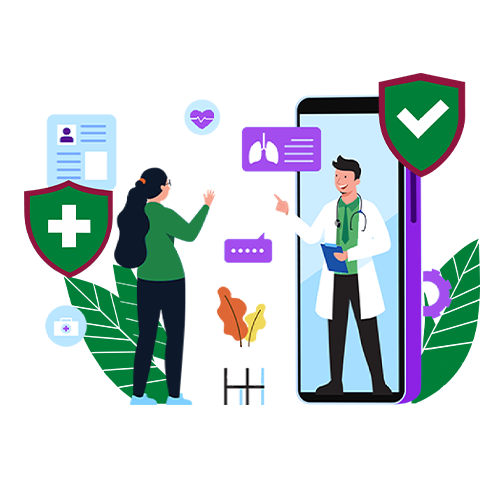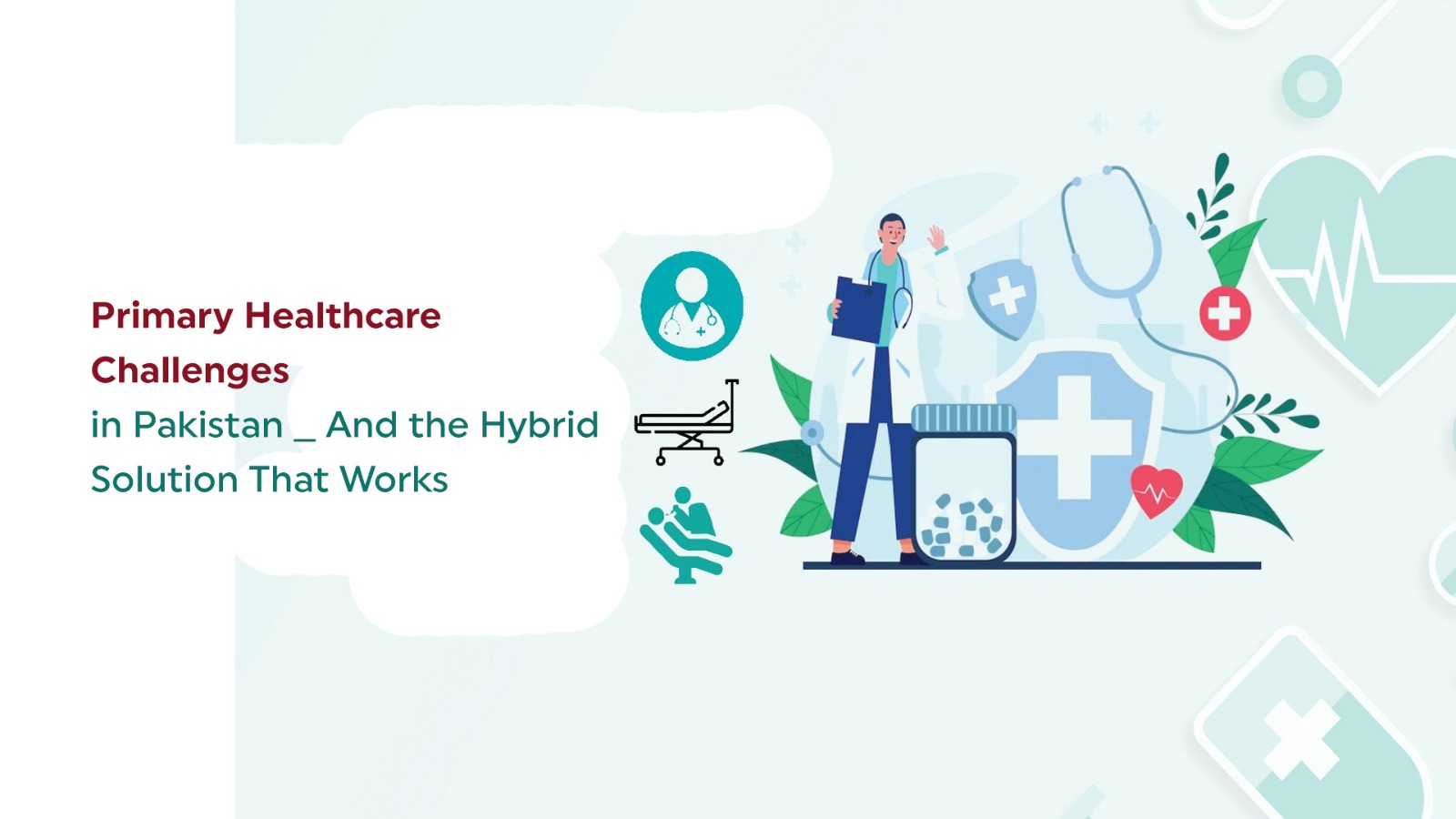Chronic kidney disease refers to the non-functionality of kidneys. When kidneys fail to perform their function of filtration and purification it leads to CKD. Kidneys play a vital role in the purification of blood in the body from extra waste, water, and toxic materials. When the body does not filter out this waste from the blood, it accumulates and causes severe diseases like permanent kidney failure.
Quick Links
ToggleKidneys are bean-shaped organs located below the ribcage on both sides of the spine. They filter blood in the body resulting in the formation of urine. At the same time, pure blood is returned to the body. In a normal body, the kidney filters approximately half a cup of blood in one minute. Kidneys also help in the regulation of blood pressure, maintaining the health of bones, production of red blood cells, and regulation of some blood chemicals.
The main reasons for kidney failure are high blood pressure and diabetes. They affect kidney functions hence causing kidney failure. It results in kidney transplants or dialysis for the purification of blood.
According to research in the United States, 15% of adults suffer from chronic kidney disease. About 37 million people have chronic kidney disease.
In the US, high blood pressure and diabetes are the main causes of kidney failure. Approximately 3 out of 4 people have chronic disease. It is considered a silent killer.
Chronic Kidney || Stages
Chronic kidney disease (CKD) affects kidney function and often goes unnoticed in its early stages. The table below outlines the stages of CKD for better understanding.
| Stages | Description | Glomerular Filtration Rate (GFR) | Symptoms |
| Stage 1 | Kidney damage with normal or high GFR | GFR > 90 mL/min | Kidney damage is often detected through abnormal urine, and imaging tests despite GFR. |
| Stage 2 | Mild reduction in GFR | GFR = 60-89 mL/min | Kidney function is slightly reduced, indicating early damage, and minimal symptoms. |
| Stage 3 | Moderate reduction in GFR | GFR = 30-59 mL/min | Kidney function is moderately reduced in Stage 3, increasing the risk of complications such as anemia and bone disease. |
| Stage 3a | Moderately reduced GFR with GFR ranging from 45-59 mL/min | GFR = 45-59 mL/min | Stage 3a represents a moderately reduced GFR with GFR ranging from 45-59 mL/min. The symptoms and management approach are similar to Stage 3. |
| Stage 3b | Moderately reduced GFR with GFR ranging from 30-44 mL/min | GFR = 30-44 mL/min | Stage 3b represents a moderately reduced GFR with GFR ranging from 30-44 mL/min. The symptoms and management approach are similar to Stage 3. |
| Stage 4 | Severe reduction in GFR, indicating advanced kidney damage and increased risk | GFR = 15-29 mL/min | This stage signifies a severe reduction in GFR, indicating advanced kidney damage. Individuals may experience more pronounced symptoms. |
| Stage 5 | Kidney failure (End-stage renal disease) | GFR < 15 mL/min or Dialysis | Stage 5 CKD, also known as end-stage renal disease (ESRD), occurs when kidney function is severely compromised. Immediate medical intervention such as renal replacement therapy is required. |
Symptoms
CKD in the early stage is not noticeable. While after some stages its symptoms start appearing. A few symptoms are discussed here:
- CKD causes loss of appetite as it weakens the immune system.
- A person often feels tired and bored with a low energy level. It makes men lethargic.
- A person feels more urination due to the accumulation of extra unfiltered water in the body.
- It makes skin dry and allergic.
- Due to weakness hands and feet are swollen. A person may feel muscles cramping.
- CKD also affects the concentration of the mind. It disturbs the sleeping routine.
- It also causes nausea and vomiting.
Challenges associated with Chronic Kidney Disease:
A person suffering from CKD may face the following severe challenges to his body:
- It weakens the immune system and causes anemia which decreases the production of red blood cells in the body. Due to this, the body becomes vulnerable to different disease attacks.
- It weakens bones.
- Due to the malfunctioning of the kidney chemical balance in the body is disturbed.
- A person with CKD may also experience heart attack, high blood pressure, and other diseases.
- It also affects minerals quantity in the body causing hyperphosphatemia (high phosphorus) and hyperkalemia (high Pottasium).
Causes
Several factors actively play a role in chronic kidney disease. A few are discussed here:
- Diabetes and Hypertension are the main causes of kidney failure. Due to continuous high blood pressure, blood sugar levels in blood vessels like arteries become narrower and harder. It affects the blood supply to the kidneys. Due to this kidneys fail to perform their function of filtration.
- Glomerulonephritis: It is the inflammation of the glomerulus. These are smaller units of blood vessels interconnected in the kidney. They play their role in the filtration process. They allow smaller tiny waste and water to pass through them.
- Polycystic Kidney Disease: It occurs due to gene mutation. It causes the growth of large cysts in the kidney that are filled with fluid. Due to enlarged sacs kidneys also become enlarged hence reducing their function.
- Smoking, obesity, drug addiction aging, etc. are factors that also cause chronic kidney disease.
When should I see my healthcare provider?
Don’t wait until it’s too late—schedule an appointment with your doctor if you notice any signs of kidney disease. Early detection can prevent serious complications.
If you have conditions that raise your risk, ask your doctor about regular blood pressure, urine, and blood tests to keep track of your kidney health. Take action now to protect your well-being!
Diagnosis
The following tests can diagnose CKD:
Blood Test:
The doctor performs a blood test to check the quantity of glomerular filtrate in the blood. If it is less than 15, the patient is at the last stage of CKD. At this stage, the only cure is a kidney transplant or regular dialysis. The doctor also checks the creatinine level in the blood through a blood test. Creatinine is a waste product. If kidneys are working well there will be no creatinine in the blood.
Urine Test:
A urine test checks the quantity of albumin protein in urine. If kidneys are functioning properly then there will be no albumin in urine. But if there is any problem in kidney functions then albumin will pass through blood in the urine. The presence of albumin in the urine is called albuminuria.
Management of CKD
As it is said, prevention is better than cure. There is no cure for CKD, but by following some steps one can avoid CKD:
- People should visit their kidney specialist biennially or annually for proper checkups of kidneys. So that if there is any issue it might be detected and cured timely.
- Diabetes is a major cause of CKD. Therefore, people should try to maintain their glucose levels.
- The use of medicine and tablets without a prescription from a doctor also affects the kidneys. Therefore, people should avoid taking random medicine for an instant cure. Otherwise, it may lead to permanent kidney failure.
- High blood pressure also affects the kidneys. Therefore it is better to avoid stressful conditions to balance blood pressure.
- A balanced diet is quite helpful in maintaining the body’s health. Therefore, people should take a nutrient-rich natural diet.
- Avoid smoking and use of drugs.
- Exercise keeps a man healthy. Therefore, daily exercise keeps the body fit and active. It makes the body and immune system stronger.
Treatment of Chronic Kidney Disease
There is no one-step cure for chronic kidney disease. In the initial stage, it can be cured by following a healthy lifestyle. Control of hypertension and diabetes is also mandatory to avoid CKD. For this purpose, doctors prescribe blood pressure and hypertension-controlling medicines like ramipril and dapagliflozin respectively. But if CKD gets worse it may be cured only in two ways.

1- Kidney Transplant
A kidney transplant is a type of surgery in which a healthy kidney replaces an affected one. Surgeons perform this procedure in the final stage of CKD.
During surgery due to excessive bleeding blood clots may form. It may also result in the bursting or leakage of the ureter. If the donated kidney is already infectious it may cause cancer. It can also cause a heart attack.
2- Dialysis
It is a process used to remove extra water, and waste material from the blood. Dialysis is of further of two types.
3- Hemodialysis
In this process, a machine called a dialyzer connects to the body. It also serves as an artificial kidney. The dialyzer pumps blood in, cleans it, and removes waste material. Then, the clean blood pumps back into the body. This procedure typically occurs three times a week in hospitals and dialysis centers.
4- Peritoneal Dialysis
Peritoneal dialysis uses the lining of the abdomen to naturally filter waste inside the body. A doctor inserts a soft tube called a catheter into the belly. This tube contains a dialysate solution. This solution absorbs fluid from the body through blood vessels in the peritoneum. Then this fluid with waste materials is pumped out of the body.
Causes of Chronic Kidney Disease
It may also cause some harmful effects.
- An infection is caused in the belly where the catheter was inserted.
- It may cause muscle cramping due to prolonged sessions of dialysis.
- It may also lower blood pressure causing nausea, dizziness, and fatigue.
- Due to accumulated waste material, it may also cause allergic reactions.
- The disturbance also affects potassium, sodium, and calcium levels.
- Due to excessive flow of water, it may lead to dehydration.
- It also causes anemia by lowering red blood cell production in the body.
Conclusion
CKD is a serious issue that has severe effects on health. As there is no permanent cure for CKD except dialysis and kidney transplants, people should take preventive measures. Regular checkups can diagnose it in the early stage, preventing heavy damage to the kidneys.
People should adopt a healthy lifestyle. It can help them to manage CKD. Seminars should be conducting the public level to spread awareness in people against the effects and symptoms of CKD. By following these steps we can combat CKD.
Frequently Ask Questions
Various factors cause CKD. Major factors are diabetes and high blood pressure.
Creatinine levels for stage 3 kidney disease generally range from 30-59 mL/min.
Duration in stage 3 kidney disease varies based on individual health factors.
Creatinine levels for stage 4 kidney disease usually fall between 15-29 mL/min.














